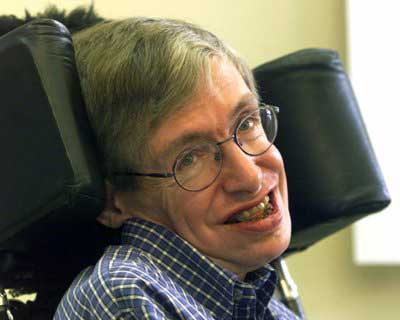 |
|
File photo of Hawking. Heaven is a fairy story for people afraid of the dark, the eminent British theoretical physicist Stephen Hawking said in an interview published on Monday. |
|
Heaven is a fairy story for people afraid of the dark, the eminent British theoretical physicist Stephen Hawking said in an interview published on Monday. Hawking, 69, was expected to die within a few years of being diagnosed with degenerative motor neurone disease at the age of 21, but became one of the world's most famous scientists with the publication of his 1988 book "A Brief History of Time." "I have lived with the prospect of an early death for the last 49 years. I'm not afraid of death, but I'm in no hurry to die. I have so much I want to do first," he told the Guardian newspaper. "I regard the brain as a computer which will stop working when its components fail. There is no heaven or afterlife for broken down computers; that is a fairy story for people afraid of the dark." When asked how we should live he said: "We should seek the greatest value of our action." Hawking gave the interview ahead of the Google Zeitgeist meeting in London where he will join speakers including British finance minister George Osborne and Nobel prize-winning economist Joseph Stiglitz. Addressing the question "Why are we here?" he will argue tiny quantum fluctuations in the very early universe sowed the seeds of human life. The former Cambridge University Lucasian Professor of Mathematics, a post once also held by Isaac Newton, has a history of drawing criticism for his comments on religion. His 2010 book "The Grand Design" provoked a backlash among religious leaders, including chief rabbi Lord Sacks, for arguing there was no need for a divine force to explain the creation of the universe. As a result of his incurable illness Hawking can only speak through a voice synthesizer and is almost completely paralyzed. He sparked serious concerns in 2009 when he was hospitalized after falling seriously ill following a lecture tour in the United States but has since returned to Cambridge University as a director of research. (Read by Renee Haines. Renee Haines is a journalist at the China Daily Website.) (Agencies)
|
英國著名理論物理學家史蒂芬?霍金在本周一刊登的一次采訪中稱,天堂是“為害怕黑暗的人編造的童話”。 霍金在21歲時被診斷患有退行性運動神經(jīng)元病,當時預期壽命不長,但如今他已年屆69歲,1988年出版《時間簡史》后躋身全球最著名科學家之列。 他告訴《衛(wèi)報》記者:“過去49年我一直覺得自己活不長。我不怕死,但我也不想死太早。我還有那么多要做的事情。” “我把大腦看成一個計算機,零件壞了之后就會停止工作。對壞掉的電腦來說,根本沒有天堂和來世,那是給怕黑的人編的童話。” 當被問及我們應如何生活時他說:“我們應尋求自身的最大價值。” 霍金參加在倫敦舉行的谷歌排行榜會議前接受了此次采訪。將在此次會議上發(fā)言的還有英國財政大臣喬治?奧斯本、諾貝爾獎經(jīng)濟學獎獲得者約瑟夫?斯蒂格利茨等人。 在回答“人類為什么會存在”這一問題時,霍金稱宇宙形成初期的微小量子波動為人類的出現(xiàn)播下了“種子”。 霍金之前的言論屢次招致宗教界的批評。他曾擔任劍橋大學盧卡斯數(shù)學教授。艾薩克?牛頓也曾擔任這一職務。 他在2010年出版的《偉大的設計》一書中提出,宇宙的存在不需要上帝去解釋,遭到宗教領袖的猛烈抨擊,其中包括(英國猶太人教會領袖)首席拉比薩克斯勛爵。 由于身患無法治愈的疾病,霍金只能通過語音合成器講話,而且?guī)缀跞戆c瘓。 2009年,霍金在美國巡回演講時曾大病一場,被送往醫(yī)院,引起了人們的擔憂。此后他重返劍橋大學,擔任研究主管。 相關閱讀 (中國日報網(wǎng)英語點津 Julie 編輯:馮明惠) |
|
Vocabulary: afterlife: life after death or at a later time in a person's lifetime(來生,來世) backlash: a sudden and adverse reaction(強烈抵制,集體反對) |
